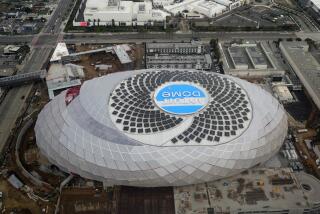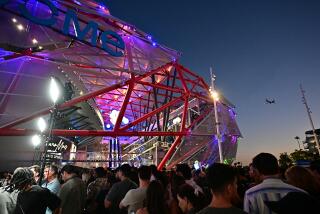Club Postnuclear to Change Policy, Seek Beer License
- Share via
After a dry opening month, Club Postnuclear is planning to pull back from its unusual no-alcohol policy. “We’re gonna try the brew,” manager Paul Hartmann said Tuesday.
Hartmann said that Postnuclear, a modernistic-looking new pop music nightclub in Laguna Beach, is applying for state and local approval to sell beer.
The club isn’t seeking a license for wine or hard liquor, Hartmann said. By selling beer only, he said, Postnuclear will be able to admit a crowd that is 18 or over, rather than having to raise the age limit to 21. (Officials at the state Department of Alcoholic Beverage Control and the Laguna Beach Planning Department said Wednesday that they had not yet received applications from Postnuclear.)
Slack attendance and difficulties in competing for bookings with the Coach House in San Juan Capistrano prompted the decision to try to uncork a new revenue source, Hartmann said. Postnuclear opened July 30 with streamlined, high-tech decor and a health-conscious attitude in which smoking was banned and the bar offered only soft drinks, milk shakes, espressos and juice concoctions.
The no-alcohol concept championed by Postnuclear’s owner, real estate investor William (Max) Nee, went against the conventional wisdom of the concert nightclub business, in which bar profits are essential to success.
“It was noble of (Nee) to make that effort, but we’re trying to be flexible,” Hartmann said. “We’re not going to sit around and lose money.”
Hartmann said that Nee wasn’t easily persuaded to apply for a beer license and that the owner is hoping the club’s fortunes will turn around without beer sales during the remaining alcohol-free period while the application is still pending. Hartmann said that he wasn’t sure how long the application process takes but that it will probably be at least one or two months before beer starts to flow at Postnuclear.
“I think it’ll help immensely,” he said. “We’ll get more of a crowd. Everybody wants to have a beer.” The club’s no-smoking policy remains unchanged.
Postnuclear has focused on reggae bands and new rock acts that attract a young audience, but the club has had little success in outbidding the better-established Coach House for talent. Added revenue from beer sales will put Postnuclear in a better bidding position, Hartmann said. But beyond that, the Coach House’s longstanding relationship with many established acts makes it hard for the Postnuclear to lure them away.
As an example, Hartmann cited David Lindley, a perennial Coach House favorite whom Hartmann had hoped to book at Postnuclear because he and Lindley are friends.
“We can’t get him, no matter how good a friend he is,” Hartmann said, because booking agents and managers are reluctant to jeopardize established friendly relationships with clubs. The answer, Hartmann said, will be for Postnuclear to book up-and-coming acts, thereby establishing its own ties with future stars.
“If their records are good and they’re getting any air play, we’ll go (for) them,” he said.
The 499-capacity Postnuclear had its best night on Aug. 31 when Jamaican reggae singer Ini Kamoze drew 300 people, Hartmann said. The club has started a series of Wednesday night reggae concerts featuring Southern California bands.
Hartmann said Postnuclear is averaging about 150 customers on Fridays and Saturdays, when the club offers recorded dance music, interspersed sometimes with live performances by lesser-known bands.
Appearing Friday is Los Angeles band Broken Toys, substituting for Beatnik Beatch, a sharp San Francisco pop band whose previously advertised appearance has been postponed. Burning Spear, a reggae act that Postnuclear landed after some back-and-forth sparring with the Coach House, plays Sept. 12, followed on Sept. 17 by Renee Geyer, a highly regarded R&B; singer from Australia.



